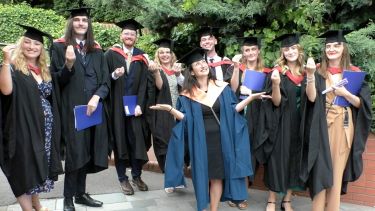Italian
Italian is considered by many the most romantic and musical language in the world. It is the language of one of the richest culinary traditions but also of classical music, art history, design and fashion.

Italy has the greatest number of UNESCO World Heritage Sites in the world and continues to charm with its breath-taking landscapes and cities rich in art and history.
In June 2022 we interviewed five of our linguists on the BA in Modern Languages and Cultures. We asked them what they thought about our classes, the topics covered and more in general why they had picked Italian in their first year at Sheffield.
Ruth's Testimonial
"I’m Ruth and I studied Italian alongside French and German as part of the BA Modern Languages degree at Sheffield. I had no prior knowledge of Italian before starting but it became my favourite language thanks to the teaching and the very tangible progress we were making every week. With the Beginners Accelerated course, we could have basic conversations by Christmas of first year. Four years later we were presenting on topics such as the migrant crisis and Italy’s colonial past.
The language classes included studying films, culture and politics and we often had the chance to choose our own topics to research. Public speaking became a lot less daunting as the course progressed which massively helped with other parts of my degree! The tutors got to know us all well and were attentive to not just our strengths and weaknesses in Italian, but also our personalities and the ways in which we learned best.
Italian is an ideal language within the BAMLC course and fits well with languages like French and Spanish. Despite only being 20 credits of my degree, studying Italian has given me so much over the past four years. There are so many people and places I would never have got to know had I not chosen Italian!"
- Find us on Facebook and join our group Italian at the MLTC
- Find the Italian Society on Facebook
Undergraduate degree combinations
To see how our degrees can be structured and combined, please visit the following:
BA Modern Languages & Cultures (BAMLC) - this course allows you to choose between one and three languages to study.
Dual degrees with a non-language - these options allow you to take a language (or two, in some cases) alongside a non-language subject.
Course
At Sheffield you can start studying Italian from scratch with no prior knowledge. All our language classes are informal and taught in small groups. The emphasis is always on real language in real situations. Right from the start of the course you will be encouraged to speak as much as possible; after all, the best way to learn is by doing. Grammar is taught in context, as it arises in the materials in use, and is immediately put into practice with pair and group activities so that you will be able to really understand all its nuances and become a confident user.
You will be presented with a variety of materials on contemporary Italian society and matters of academic interest and will participate in lively debates on topics such as stereotypes and the phenomenon of Mammismo, controversies around the protection and restoration of many cultural heritage sites, the North and South cultural and economic divide, the recent rise of populist parties on the Italian political scene and many other issues affecting Italy today. We will also watch and review a selection of Italian films that will give you an insight into the reality of life in Italy.
Modules
At Sheffield you can study Italian ab initio. These modules will develop your speaking, listening, reading and writing skills as well as developing your awareness and understanding of Italian culture.
|
Title |
Credits |
Core/Optional |
|---|---|---|
| Italian Beginners Intensive 1 (Autumn) | 10 | Core |
| Italian Beginners Intensive 2 (Spring) | 10 | Core |
Italian Language Intermediate
|
Title |
Credits |
Core/Optional |
|---|---|---|
| Italian Intermediate Intensive 1 (Autumn) | 20 | Core |
| Italian Intermediate Intensive 2 (Spring) | 20 | Core |
We do not offer a year abroad in Italy. You will spend your year abroad in countries where your other language or languages are spoken.
Italian Language Advanced
|
Title |
Credits |
Core/Optional |
|---|---|---|
| Italian Higher Advanced 1 (Autumn) | 10 | Core |
| Italian Higher Advanced 2 (Spring) | 10 | Core |
The content of our courses is reviewed annually to make sure it is up-to-date and relevant. Individual modules are occasionally updated or withdrawn. This is in response to discoveries through our world-leading research, funding changes, professional accreditation requirements, student or employer feedback, outcomes of reviews, and variations in staff or student numbers. In the event of any change we'll consult and inform students in good time and take reasonable steps to minimise disruption.
Information last updated:



